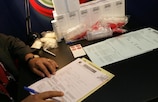U17s warned of doping dangers
Monday, May 6, 2013
Article summary
The eight teams at the 2013 UEFA European U17 Championship finals in Slovakia have been made aware of the dangers of doping as part of UEFA's continuing fight to keep football clean.
Article top media content

Article body
Hosts Slovakia were the first of the eight participating nations to hear the anti-doping message at the 2013 UEFA European Under-17 Championship finals as UEFA continues to strive to keep drug cheats out of football.
"It's very important for you as young footballers. The rules are clear. If you break the rules, you can be banned for a long time and your career ruined," Richard Grisdale, from UEFA's anti-doping unit, told the Slovakia squad. "Doping is cheating. We want the winners to be the team that trained the best, that played the best. Not the team that has access to the best drugs."
The squads were shown a presentation detailing how players are selected for the doping control and the specifics of producing samples, which proved particularly informative for many of the finalists who have never undergone a drugs test in their fledgling careers. "You will be tested here," said Grisdale.
An emphasis was also placed on the obligatory nature of the doping control. Once the two players from either side have been randomly selected to undergo the test, they can celebrate a victory and even collect their winner's medal, but then must immediately accompany their designated chaperone to the doping control.
"You'll want something from the dressing room, but ask the team doctor, ask a team-mate to get it for you. Don't go and get it yourself. Players have been disciplined just for going to the dressing room," said Grisdale, who advised players: "Relax, have a drink, talk to your team-mate, be patient."
With a positive test incurring a ban of up to two years, the impact on a career could be catastrophic. A number of resources are on hand for players to check which substances are on the World Anti-Doping Agency's (WADA) banned list, including local federations, the Global DRO website and UEFA itself.
Players were told they should also consult team doctors before taking medication, particularly if they need special permission, known as a Therapeutic Use Exemption, to take medicines containing banned substances to cure an ailment or control a long-term problem.
Grisdale emphasised, however, it is ultimately players themselves who must take responsibility for what is in their bodies, a principle known as 'strict liability'. "The laboratory just tells us what it contains, not why it's there. We have to assume the worst. We have to assume you were cheating," he said.
A wealth of potential pitfalls and common problems were covered, from over-the-counter medications which could contain banned substances to nutritional supplements and recreational drugs, while pictures of the irreversible consequences of taking anabolic steroids reinforced the moral aspect of the anti-doping message with a stark, health-based argument.
"Your career will also be affected – your current career with your contract, your future career as a coach or pundit. It brings a lot of unwanted attention for friends and family. No one likes a drug cheat," said Grisdale. "The information is out there. Don't be afraid to ask, because a small mistake can have a very big effect on your career."










